A Deep Dive into Hunter x Hunter: Impact and Evolution
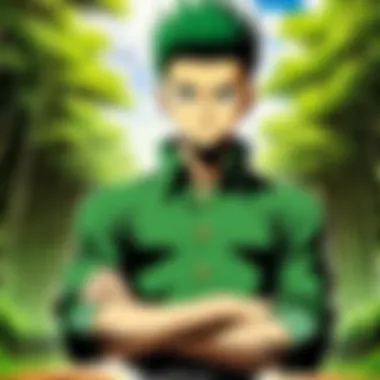
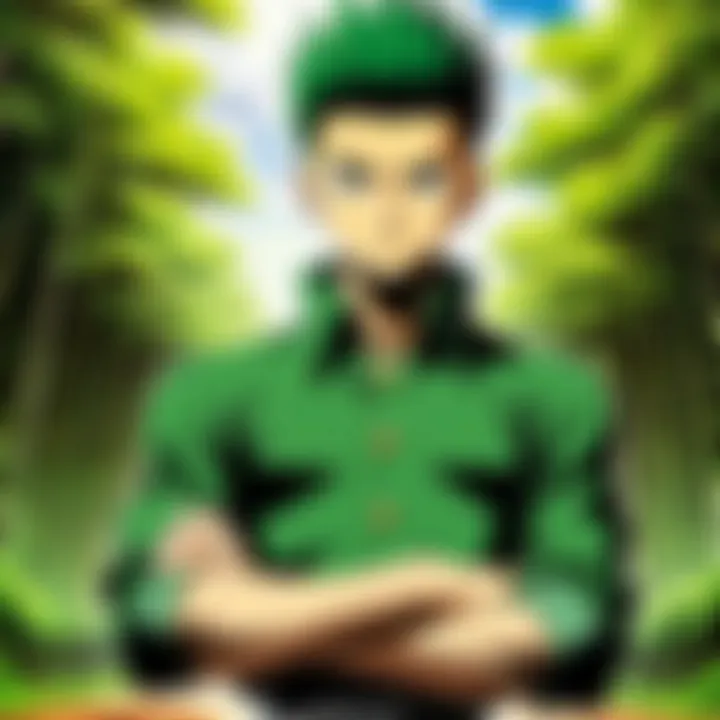
Intro
In the intricate universe of manga, few titles stand out quite like Hunter x Hunter. Since its debut in 1998, Yoshihiro Togashi's creation has crafted a multi-layered narrative that enthralls audiences and invites them to ponder deeper philosophical questions. At its core, Hunter x Hunter is not just a tale about adventures and battles; it explores themes of friendship, ambition, and moral ambiguity. As we embark on this exploration of its journey and impact, we will delve into the artistry behind its characters, the complexity of its themes, and its lasting legacy in both manga and anime.
Character Profiles
Understanding the characters in Hunter x Hunter is paramount, as they are not only conduits for the plot but also serve as reflections of broader themes. Let's break it down into main characters and supporting ones.
Overview of Main Characters
- Gon Freecss: The naive yet determined protagonist, Gon sets out on a journey to become a Hunter and find his father. His character embodies pure-hearted determination and an unwavering sense of justice. However, through his adventures, we see his growth—a transition from innocence to a more complex moral understanding.
- Killua Zoldyck: Coming from a notorious family of assassins, Killua grapples with his identity throughout the narrative. He is often portrayed as witty and cynical, but his loyalty to Gon and development of empathy make him a standout character. His internal conflicts provide a fascinating contrast to Gon’s stark idealism.
- Kurapika: Driven by vengeance for his fallen clan, Kurapika's journey is steeped in tragedy and complexity. His dedication to avenging his family while grappling with the ramifications of his quest showcases Togashi's storytelling prowess.
- Leorio Paradinight: Initially presented as a comic relief, Leorio emerges as a multifaceted character whose dreams of becoming a doctor reflect deeper societal aspirations. His growth throughout the series is a testament to the idea that even lighthearted characters can carry significant weight.
Supporting Characters
- Hisoka: An unpredictable antagonist, Hisoka's flamboyant nature and dark intentions create a captivating presence. His unique mindset challenges the other characters, especially Gon and Killua, providing tension that drives the narrative forward.
- Meruem: As the Chimera Ant arc unfolds, Meruem introduces a new dimension to the story. His evolution from a ruthless creature to a complex being capable of compassion highlights the theme of humanization amidst brutality.
Throughout the series, these characters and their developments resonate with audiences, allowing readers to connect on multiple levels.
Theme Exploration
Diving into Hunter x Hunter, one is met with a mosaic of rich themes. Not just a narrative filled with battles, it invites reflection on ideas of morality, friendship, and the essence of humanity.
Central Themes
- Morality and Ethics: The series does not shy away from moral ambiguity. Characters often face difficult choices that challenge conventional notions of right and wrong. This theme is seen in pivotal moments, where characters must grapple with their decisions and their consequences.
- Friendship and Bonds: At the heart of the story is the bond between Gon and Killua. Their relationship showcases loyalty, trust, and the struggle between personal ambitions and friendship. Togashi illustrates how these bonds profoundly affect character decisions and growth.
- Ambition and Desire: Most characters have aspirations that drive them, leading to conflict and development. The pursuit of goals often prompts them to confront their own values and ethics, leading to significant character evolution.
Cultural References
Hunter x Hunter also serves as a commentary on broader societal issues, placing its characters in scenarios that reflect real-world dilemmas. This includes the consequences of power, the nature of friendship, and what it means to truly understand someone else’s plight.
Popular Series and Recommendations
As we explore the landscape of manga and anime influenced by Hunter x Hunter, it’s helpful to situate it within a wider context. Here are some recommendations for fans of the genre.
Top Anime Series of the Year
- Demon Slayer: With stunning animation and heartfelt narratives, it has quickly risen to prominence.
- Attack on Titan: A series that blends horror with a compelling commentary on freedom and oppression.
- Jujutsu Kaisen: Known for its engaging characters and fast-paced action, it captures the essence of modern shounen.
Hidden Gems in Manga
- Yona of the Dawn: A treasure trove of character arcs and political intrigue, often overlooked.
- Magi: The Labyrinth of Magic: A blend of adventure and vibrant storytelling that deserves more attention.
Prelims to Hunter x Hunter
In the vast universe of manga and anime, Hunter x Hunter stands out as a unique and compelling narrative that continues to resonate with audiences. This section serves as a pivotal entry point into understanding the intricate layers of this manga series. Not only does it set the stage for subsequent analyses but it also sheds light on the foundational elements that have contributed to its enduring legacy. The world of Hunter x Hunter is not just one of fantasy; it melds complex character dynamics, philosophical inquiry, and suspenseful storytelling that challenge conventional genre norms.
Understanding the Concept and World-building
Hunter x Hunter crafts a meticulously structured world filled with intricate rules and systems. From the outset, it introduces readers to the role of Hunters—licensed individuals who venture into the unknown for various purposes like treasure hunting, exploring uncharted territories, and even capturing dangerous creatures. This concept forms the backbone of the series, driving the plot and character motivations.
The series takes place in a universe rich with diverse regions and cultures, each with its own distinct attributes. For example, you’ve got the ominous and perilous Dark Continent juxtaposed with the bustling civilization of Yorknew City. Such contrasting settings deepen the narrative stakes and enhance the immersive quality of the manga. Talented creator Yoshihiro Togashi integrates specific cultural references and mythological elements that breathe life into this expansive tapestry.
Additionally, there’s a notable emphasis on the personal journey of the characters, which intertwines seamlessly with the world they inhabit. As readers explore the intricacies of the NEN system, a unique form of energy manipulation, they learn not only about combat efficacy but also about the characters’ internal struggles and philosophies.
Creator Yoshihiro Togashi: Vision and Influence
At the helm of this extraordinary world is Yoshihiro Togashi, a formidable talent with an innovative vision that stretches beyond typical manga storytelling. Togashi's background as a manga artist is marked by an unconventional approach to themes of ambition, morality, and the human condition. He delves deeply into the psyche of his characters to portray nuanced dilemmas, often presenting scenarios where ethical lines blur.
The artistic evolution in Hunter x Hunter is directly tied to Togashi’s experiences and influences. His earlier work on Yu Yu Hakusho laid a foundation, but it was with Hunter x Hunter that he refined his craft, pushing the boundaries of visual storytelling. Many fans note that his unpredictable pacing and intricate plot developments set a high bar for the manga genre.
Moreover, Togashi’s health challenges have added an interesting layer of understanding about creative processes. His sporadic updates and hiatuses have stirred debates about writer responsibility and audience expectations. Despite these interruptions, the strong narrative has fostered a passionate fanbase that eagerly anticipates the saga's continuation.
“Togashi has woven a structure around which characters embody not just archetypes but real dilemmas and questions of existence.”
In summary, this introduction forms a crucial understanding of Hunter x Hunter, laying the groundwork to explore its multifaceted narrative arcs, character journeys, central themes, and its far-reaching impact on the world of manga and anime.
Origins of the Manga
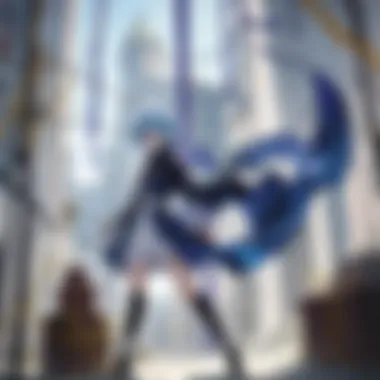
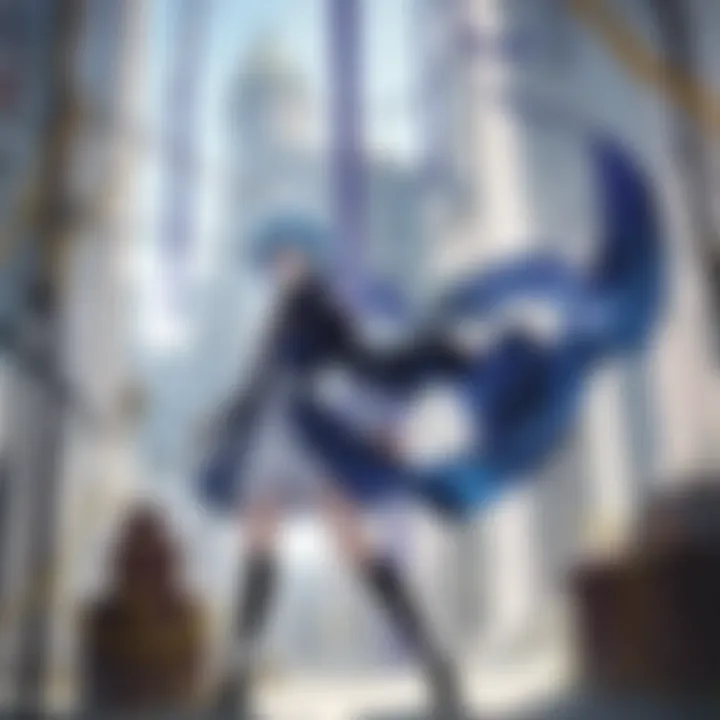
The inception of Hunter x Hunter marks a significant moment in the world of manga. This section delves into the beginnings of this beloved series, highlighting how its initial release laid the groundwork for the rich, intricate narrative that has captivated fans for decades. Understanding the origins not only helps to appreciate the story's evolution but also reveals the factors that contributed to its enduring popularity.
Initial Release and Serialization
Hunter x Hunter first graced the pages of Weekly Shōnen Jump in March 1998. This was during a transformative time for manga, with the genre pulling in a diverse audience. Yoshihiro Togashi, the creator, debuted his brainchild after seeing considerable success with his earlier work, Yu Yu Hakusho. Togashi's reputation set strong expectations for this new series. The initial chapters introduced readers to a vibrant world filled with unique characters and the concept of Hunters – individuals skilled in various trades who undertake perilous missions.
The manga's serialization was not entirely smooth. Togashi faced numerous challenges, including health issues that often delayed production. Despite this, the series initially received positive feedback for its art style and innovative storytelling. Hunter x Hunter broke away from typical shōnen tropes, presenting morally complex situations and deeper themes that resonated with readers. Below are some noteworthy points regarding its release:
- Diverse Appeal: Unlike many shōnen titles of the time, Hunter x Hunter did not solely focus on battles, instead, embedding rich narratives and emotional depth.
- Unique Structure: The arcs within the manga didn't follow conventional formulas; they often switched dynamics, maintaining reader interest and engagement.
- Impactful Characters: Characters like Gon and Killua captured audiences with their unique backgrounds and character growth, establishing a standard for future manga characters.
Cultural and Historical Context
The late 1990s marked a crucial period in the manga industry, seeing the rise of various genres, with shōnen gaining immense popularity. In this landscape, Hunter x Hunter stood out due to its radical shift from straightforward heroism to a more nuanced depiction of human emotions and challenges.
Culturally, Japan was also experiencing shifts in societal values and youth perspectives. The themes of ambition and morality depicted in Hunter x Hunter resonated with a generation grappling with their identities and aspirations in an increasingly complex world. This cultural pulse is reflected in the characters’ journeys and the ethical dilemmas they face. Within this era, the following points stand out:
- Reflection of Societal Changes: The characters’ adventures mirror Japan’s deep-rooted values while addressing contemporary issues of ambition and friendship.
- Influence on Future Works: Togashi’s approach to storytelling influenced a wave of subsequent manga series, establishing a benchmark for character development and world-building.
Understanding the origins of Hunter x Hunter provides invaluable insight into its rich narrative structure and complex themes. It showcases how a blend of personal struggles, societal reflection, and innovative storytelling can create a lasting impact in the world of manga.
Major Arcs in Hunter x Hunter
The arcs within Hunter x Hunter are crucial for comprehending the overarching narrative and character development. Each arc serves a distinct purpose, integrating unique challenges and experiences that inform the protagonists' journeys. From the foundation laid in the Hunter Exam Arc to the morally complex Chimera Ant Arc, these narrative segments are not just storylines. They engage readers in discussions about growth, ambition, and ethical dilemmas.
The Hunter Exam Arc: A Foundation
This initial arc is where everything kicks off. Here, readers meet Gon Freecss and the diverse array of characters who will shape his path. The Hunter Exam isn't just a test; it symbolizes the journey each character must embark upon to find their place in a broader world.
The stakes are set high; failure means not just losing a title but potentially life itself. This kind of pressure allows for different character setups, from ambitious Killua Zoldyck to the determined Gon. Each participant brings individual motives, which enrich the narrative and provide insights into themes of ambition and resilience.
In many ways, the Hunter Exam serves as a microcosm of the series, encapsulating the spirit of adventure and discovery that defines Hunter x Hunter. The lessons learned here resonate throughout the series, making it foundational to understanding the growth and conflict that follows.
Heavens Arena Arc: Combat and Strategy
Once the characters have navigated the challenges of the Hunter Exam, they delve into the Heavens Arena Arc, where physical prowess combines with strategic thinking. This arc introduces the concept of Nen, a skill that allows individuals to harness their life energy for combat.
Understanding Nen is critical for any Hunter's success. Here, we witness the evolution of combat within the series. It pushes characters to refine their abilities while emphasizing that sheer strength isn't the only path to victory. For instance, Killua learns to use his speed and agile tactics effectively, contrasting Gon's brute strength approach.
The Heavens Arena offers not just battles but also insights into various fighting styles and techniques. It serves to illustrate that a deeper understanding of one's abilities is key to overcoming challenges.
Greed Island Arc: Unique Game Mechanics
The Greed Island Arc takes a turn towards the fantastical, morphing into a video-game-like experience. This setting is unique; it becomes almost a playground for the characters who can manipulate not just their powers but the very environment around them.
In Greed Island, gaining cards with special powers adds a layer of strategy, teaching readers about resource management and timing. The dynamics of teamwork are particularly evident, especially as Gon and Killua must rely on their friendship to progress.
Additionally, the arc subtly raises questions about the nature of reality and escape through games. Is it possible to lose oneself in a fabricated world? The varied puzzles and games presented highlight the creativity in Yoshihiro Togashi’s storytelling, making it a standout narrative segment in the series.
Chimera Ant Arc: Ethical Dilemmas
Finally, the Chimera Ant Arc takes a dark and harrowing turn, thrusting characters into ethical quandaries that test their very humanity. The introduction of Chimera Ants — beings capable of devouring other creatures to gain their abilities — serves as a metaphorical exploration of human nature.
This arc is a stark examination of morality and the consequences of unchecked ambition. Characters like Gon face moral dilemmas that blur the lines between good and evil. The arc delves into the consequences of power and ambition, raising questions about the limits of humanity.
As the characters grapple with profound questions on life and death, this arc marks a significant departure from the earlier lighter themes of the series, showcasing Togashi's capacity to blend adventure with philosophical discourse.
"The Chimera Ant Arc shows us that strength without humanity could lead to destruction."
Through these arcs, Hunter x Hunter offers depth and complexities that resonate beyond entertainment, urging readers to reflect on their values and beliefs.
Character Analysis
The character analysis of Hunter x Hunter serves as a cornerstone in understanding the manga's intricate narrative and emotional depth. Character development isn’t just decoration here; it’s the very engine propelling the plot forward while simultaneously forging connections with readers. Each character faces their unique trials and moral dilemmas, reflecting broader themes such as ambition, loyalty, and the complexities of human nature. By dissecting these individuals, fans and newcomers alike can gain insight into what makes Hunter x Hunter stand out among its peers.
Gon Freecss: The Protagonist's Journey
Gon Freecss embodies the spirit of adventure and innocence. His quest to find his father serves not only as the backdrop of the story but as a pathway for his growth. Initially, Gon seems like a typical cheerful protagonist, enthusiastic and full of potential. Yet, as we follow his journey, layers of his character are gradually revealed. In battles, Gon’s relentless determination and willingness to put others before himself shine through, but they also lead him to momentary darkness when he loses control of his emotions.
Through Gon, we explore themes of what it means to be strong, physically and morally. His relationships with other characters, especially Killua, further deepen our understanding—showing how true strength often lies in vulnerability and the choices one makes in the face of adversity.
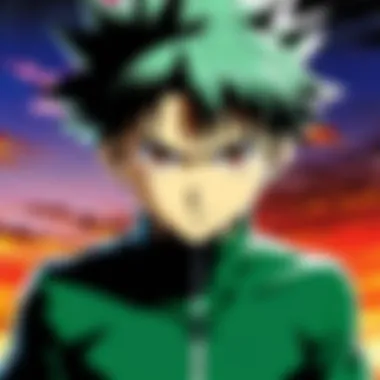
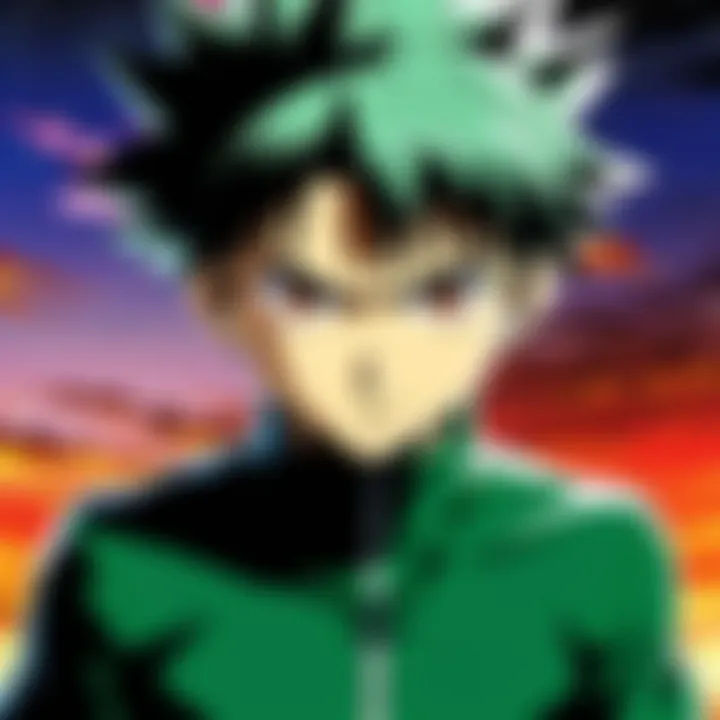
Killua Zoldyck: Background and Growth
Killua Zoldyck, hailing from a notorious family of assassins, is a character that intrigues and challenges the notion of predestination. On the surface, he seems confined by his upbringing, yet he constantly strives to carve out an identity separate from his family's dark legacy. His friendship with Gon becomes a pivotal part of his development. Killua’s struggle between his assassin instincts and his desire for genuine connection provides a rich ground for exploration.
While Killua initially acts aloof and cold, his inner conflicts reveal a deep-seated desire for self-acceptance and freedom. This duality—his training in deadly arts juxtaposed with a heart yearning for friendship—adds a profound layer to his character. By navigating through these complex emotions, readers see that true growth often comes from facing one’s past and embracing change.
Kurapika: Motivation and Conflict
Kurapika's narrative centers on themes of vengeance and justice. A member of the Kurta Clan, who suffered from a brutal massacre, Kurapika is often driven by his quest for retribution against the Phantom Troupe. His character reflects the struggles of those who seek justice in a world where morality is often blurred.
What makes Kurapika compelling is how his pursuit of vengeance contrasts with his underlying desire for peace and closure. He navigates through moral dilemmas, forcing readers to ponder the costs of revenge. As Kurapika develops from a mere seeker of retribution to a character yearning for understanding, the audience is compelled to question: Is vengeance ever truly satisfying?
Leorio Paradinight: The Comic Relief with Depth
Leorio Paradinight might initially come across as the comic relief, but a closer look reveals a character with profound layers. His aspirations to become a doctor stem from a deeply personal motive to help those in need, contrasting with the often violent world around him. Leorio’s humorous antics may lighten the mood, but they also highlight his determination and the underlying seriousness of his goals.
His camaraderie with Gon and Killua showcases the value of friendship and loyalty, adding humor while enriching the emotional landscape of the series. Leorio represents the everyman in a cast filled with extraordinary characters, making him relatable. His evolution reminds readers that even those who wear smiles carry their burdens, and that altruism can be found in unexpected places.
"Character evolution in Hunter x Hunter is more than just development; it reflects the complex interplay of morality, ambition, and the human condition."
Through these character analyses, we see more than just individual journeys—we encounter philosophical questions about humanity itself. Whether through Gon’s innocence, Killua’s rebellion against fate, Kurapika’s thirst for justice, or Leorio’s balancing of humor with depth, each character serves a purpose that enhances Hunter x Hunter as a rich, multi-faceted narrative.
Themes and Motifs
Themes and motifs are the backbone of any narrative, and in the world of Hunter x Hunter, they elevate the story beyond mere entertainment. They introduce layers of meaning that resonate with readers, challenging them to reflect on society, values, and personal beliefs. By delving into these themes, we’re not just looking at characters and plots; we’re examining ideas that provoke thought and discussion, making the manga a significant piece of art in the realm of anime and manga.
Friendship and Loyalty
One of the heartstrings in Hunter x Hunter is the theme of friendship and loyalty. The bond between Gon Freecss and Killua Zoldyck exemplifies this beautifully. Despite their vastly different backgrounds—Gon from a humble, nurturing environment and Killua from a family of ruthless assassins—they forge a connection that highlights the essence of trust and camaraderie.
In many moments throughout the series, the duo faces formidable foes and shadowy moral dilemmas. Their loyalty to one another often helps them navigate these trials, demonstrating that true friendship shines brightest in dark times. This theme resonates strongly with fans who value relationships built on respect, support, and shared experiences.
Moreover, friendship in this narrative often transcends personal gain. For instance, Kurapika’s dedication to his friends pushes him deeper into conflict with those who perpetrated violence against his clan. This underlines the idea that loyalty can sometimes lead to difficult choices, revealing a complex layer of what it means to stand up for those we care about.
Ambition and Morality
Ambition is a potent driving force in Hunter x Hunter and serves as a double-edged sword. Characters like Hisoka and Chrollo Lucilfer embody ambition in its most unrestrained form, pursuing their desires without regard for ethics or the consequences of their actions. In contrast, Gon's ambition to find his father is rooted in innocence but eventually leads him down a darker path, testing the boundaries of right and wrong.
This theme prompts readers to reflect on their own ambitions and the moral ramifications tied to them. It addresses the vital question: at what cost does one pursue their dreams? The narrative explores diverging paths, illustrating how ambition can inspire achievements but also lead to corruption or ruin.
One can’t forget to mention how Togashi weaves this theme throughout various arcs, especially in the Chimera Ant Arc, where characters grapple with the moral implications of their goals against the backdrop of their humanity.
The Nature of Humanity
The nature of humanity is perhaps the most profound and philosophical theme presented in Hunter x Hunter. Togashi crafts a narrative that doesn’t shy away from depicting the spectrum of human behavior—from real kindness to the depths of depravity. Characters frequently face moral dilemmas that force them to confront what it means to be truly human.
For example, the Chimera Ants challenge traditional notions of humanity. As they evolve, they exhibit traits and emotions that force the audience to reconsider their ideas about what separates humans from other beings. The series ultimately suggests that humanity isn’t defined by one’s species but rather by choices and actions in moments of intense struggle.
"What defines humanity? Is it our capacity for empathy or our penchant for violence?"
This overarching question encourages readers to engage in self-reflection and deeper consideration of their own actions in society. In grappling with the complexities of human nature, Hunter x Hunter not only entertains but also educates viewers on the intricacies of identity, morality, and existence.
Visual Style and Artwork
The visual style and artwork of Hunter x Hunter play a crucial role in its storytelling and overall impact. Many fans are drawn not only to the narrative but also to how the visuals enhance the experience. From intricate character designs to atmospheric environments, the art serves to immerse readers in the multifaceted world Togashi has crafted. Not only does it convey emotion and action, but it also subtly provides context and depth to the themes explored throughout the manga.
Artistic Evolution Over Time
Togashi's artwork has transgressed through various phases, paralleling the evolution of the story itself. The manga began with a more simplistic style that resembled typical shōnen manga art of the 1990s. Early arcs showcased exaggerated expressions and straightforward action sequences, which effectively engaged a younger audience. However, as the series progressed, Togashi's artistry evolved into something remarkably distinctive.
For instance, during the Chimera Ant Arc, there is a notable shift that reflects the arc's darker themes. The linework becomes more detailed, the characters’ faces exhibit a range of complex emotions, and the backgrounds become more intricately designed. This evolution mirrors the growing stakes and moral ambiguity of the storyline. Furthermore, the use of shadows and framing techniques adds layers of intensity to key moments, demonstrating how visual style can reinforce narrative tension.
"Art does not merely illustrate literature; it accentuates emotion, builds tension, and immerses the reader within its world."
The finesse in Togashi's character expressions is evident as well. Readers can almost feel Gon’s determination or Killua's inner turmoil due to the depth of the illustrations. For many, these aspects underscore the artistic evolution not just as a change in aesthetics, but as a deeper reflection of the characters' journeys.
Character Design and Symbolism
Character design in Hunter x Hunter is rich with symbolism that often signifies deeper meanings. Gon, for instance, sports a simplistic outfit initially, which signifies his straightforward nature. As he faces hurdles and evolves, so too do the aspects of his design indicate his psychological growth, often becoming more complex visually.
In contrast, Killua's design reflects both his assassin background and his inner conflict. The spiky hair is a stark representation of his dynamic energy, while his color palette often shifts between earthy tones reflecting his ties to nature and bright, almost icy hues signifying his cold upbringing made by the Zoldyck family.
The supporting characters also contribute significantly to this visual language. Leorio’s glasses, often depicted as exaggeratedly large, symbolize his ambition to be taken seriously amongst his friends and his role as the voice of reason.
Cultural Impact of Hunter x Hunter
When delving into the depths of Hunter x Hunter, it's crucial to take a step back and consider its cultural footprint. This manga, which captivates both seasoned fans and newcomers alike, has embedded itself in the tapestry of anime and manga history. From characters that explore profound emotions to intricate plotlines that challenge traditional conventions, the series has significantly shaped the genre.
Reception Among Fans and Critics
The reception of Hunter x Hunter has been a rollercoaster ride, oscillating between critical acclaim and fervent fan appreciation. Upon its initial release, readers were quick to notice how it deviated from the archetypal shōnen formula. Instead of relying solely on battles and power-ups, the manga introduced psychological depth and moral ambiguity. This was refreshing and gave rise to a diverse range of interpretations.
Fans often engage in lively debates over character motivations and the philosophical implications of the story. Killua’s struggle with his identity, for instance, resonates with many readers who have faced similar dilemmas. Critics have lauded Togashi's ability to blend action with intricate storytelling, leading to praise such as:
"Hunter x Hunter redefines what a shōnen manga can be."
However, not all critiques are positive. Some argue that the manga's pacing can be inconsistent, particularly during lengthy hiatuses. Nonetheless, its loyal fanbase has remained steadfast, continuously advocating for its unparalleled complexity and storytelling prowess.
Adaptations and Expansions: Anime and Beyond
Beyond the pages of the manga, Hunter x Hunter has transcended its original format to unfold in various adaptations. The anime adaptations play a pivotal role in expanding its reach, catering to audiences who may prefer the visual medium. The original 1999 anime introduced the world to Gon and his companions, but it was the 2011 reboot that truly catapulted the franchise into the limelight again, offering a fresher animation style and a more faithful adaptation of the manga arcs.
These adaptations sparked a resurgence in Hunter x Hunter's popularity, drawing in new viewers who might not have encountered the manga. The series has spawned a veritable cornucopia of merchandise, video games, and spin-offs, further solidifying its cultural prominence.
In addition to animated adaptations, the narrative's depth has inspired various forms of media, from fan art to fan fiction. Notably, platforms like Reddit foster spaces for fans to share their theories, critiques, and interpretations, demonstrating how Hunter x Hunter encourages active engagement within its community.
To summarize, the cultural significance of Hunter x Hunter can be likened to a well-aged vintage, becoming richer and more nuanced with time. Its reception among fans and critics reflects a deep-rooted appreciation for its storytelling elegance and moral complexities, while its adaptations ensure that it remains relevant in contemporary discussions about manga and anime.
Challenges and Controversies
Hunter x Hunter, while revered for its innovation and depth, hasn't danced through a field of daisies in its journey. The challenges and controversies surrounding the manga add layers to its storytelling and reception. Discussing these elements becomes essential for a full appreciation of its place in anime and manga culture. Understanding the hurdles faced by the creator, Yoshihiro Togashi, as well as the contentious themes he explores, unveils the complexities behind both the narrative and its impact on fandom.
Publication Irregularities
The publication history of Hunter x Hunter is akin to a rollercoaster ride, with dramatic ups and downs. First serialized in 1998, the manga has seen numerous hiatuses, often leaving fans biting their nails in agony. These irregularities stem from multiple factors, including Togashi's health complications.
Fans have learned to adapt to the waits, some even humorously dubbing the periods between chapters as the "Hiatus x Hiatus" phase. The unpredictability of new content, however, feeds into a larger conversation about artist wellness and the pressures of the manga industry. In a sense, the irregularity serves as a reminder that even creators of great works are not immune to personal battles.
"True artistry demands sacrifice, but at what cost?"
Through these struggles, Togashi's occasional refrains and reflections on mental health challenges speak volumes. Every delay becomes a moment for discourse in the community, as fans grapple with both their passion for the series and empathy for its creator.
Contentious Themes and Interpretations
Hunter x Hunter does not shy away from difficult subjects, using its medium to delve into philosophical quandaries and ethical dilemmas. The exploration of themes like morality, ambition, and the grim realities of human nature is where things get a bit spicy. Some readers might find themselves questioning their own values as they navigate the complex interactions among characters.
For instance, the Chimera Ant Arc is often discussed as a turning point where the manga confronts its most substantial moral dilemmas. The transformation of characters, especially in the context of identity and morality, draws various interpretations, sometimes leading to heated debates within the fandom.
- Is Killua's evolution a manifestation of redemption or a tussle with his nature?
- Does Gon’s journey reflect a critique of naivety in the face of harsh realities?
Furthemore, the portrayal of violence and the psychological burdens placed on young characters may shock or disturb some readers. Yet, it’s this very rawness that adds depth to the narrative. The controversial narrative threads force fans to wrestle with their responses and interpretations, enriching discussions around the manga.
The Future of Hunter x Hunter
Examining the potential future of Hunter x Hunter offers crucial insights into not just the continuity of the story, but also its ongoing cultural significance. The series has garnered a devoted following, and there's a palpable interest in how the narrative may evolve further. Articulating these prospects is essential in the landscape of anime and manga, where the anticipation surrounding a beloved series can influence community dynamics and fan engagement.
The future reflects the interplay between creator Yoshihiro Togashi's health, fan expectations, and the broader industry environment. All these facets suggest a rich tapestry awaiting exploration beyond what has already been narrated.
Prospects for Continuation
The uncertainty surrounding the continuation of Hunter x Hunter largely hinges on Togashi's health. Illness has plagued his work, leading to significant hiatuses that leave fans in suspense. Nevertheless, the story’s intrinsic momentum remains strong. Readers are eager to see how Gon Freecss's journey unfolds and whether he will find his father, Ging. Similarly, Killua Zoldyck's evolution and Kurapika's quest for vengeance keep the narrative threading onward, bespeaking immense potential.
Fans remain hopeful, as occasional notes from Togashi provide a sliver of optimism in an otherwise fixed pattern of uncertainty. As long as the themes resonate, the community’s cries for continuation will ensure that talk of the series persists.
Potential Developments in the Storyline
As we speculate on what’s to come, several paths seem plausible for Hunter x Hunter. Foremost is the idea that the Dark Continent Expedition, hinted at in past arcs, could unfold into something substantial. This part of the narrative promises a multitude of challenges, unique creatures, and moral ambiguities that are synonymous with Togashi’s writing style.
Contrasting Gon’s childhood innocence with the harsh realities of this dark continent could serve to deepen character dynamics. It would explore complex themes such as leadership responsibility versus personal ambition, moral compromise, and the limits of friendship—elements Togashi has masterfully interwoven throughout the series.
Other developments may involve revisiting characters like Meruem, who left a significant impact on readers during the Chimera Ant arc. The potential for his return opens avenues for new character interactions and philosophical dilemmas, prioritizing questions about what it means to be human.
In summary, while uncertain, the future storylines in Hunter x Hunter become an exciting realm of possibilities. Its previous arcs have set a meaningful groundwork for a character-rich and emotionally powerful continuation.







